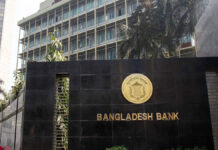Ashok Ghosh always dreamt of owning a dairy farm with 100 cows, and he was cruising towards it, too, until the political unrest bubbled over on October 26 last year.
Sales have been sporadic since, as the large milk processors, most of which are based in Dhaka, are unable to send in their milk tankers to collect the produce from farmers on a daily basis due to the virtually non-stop shutdowns and blockades.
To get by, Ghosh has to sell his produce to local sweetmeat shops and neighbours. But that too has become a struggle for him nowadays due to the excess supply. Prices of milk have fallen to Tk 20-25 each litre, down from the average price of Tk 40 per litre.
“No-one wants to buy milk. How will I be able to continue to feed my cows if things go on like this?” said the frustrated 37-year-old farmer from Jhikorgachha in Jessore early last month.
Unable to bear the costs any further, he started selling his milking cows in the middle of December. So far, he has sold 15 of them, leaving him with just three. He also had to lay off one of his two workers.
Ghosh is not alone—thousands of milkmen across the country are in the same boat as him.
Take, Abdul Aziz, a dairy farmer from Debhata upazila in Satkhira. Last month, he sold two of his six milking cows in a bid to reduce the pressure on his wallet for feed purchases.
He has to spend Tk 350 to buy feeds for a cow giving one litre of milk a day. But now, he gets Tk 230 at best by selling the produce.
Provash Ghosh, a farmer from Tala upazila of Satkhira, said regular purchases by the milk processor Brac helped him buy feeds and pay monthly instalment for loans taken earlier for cow rearing.
But thanks to the political deadlock which broke down his regular sales cycle, he became a defaulter, prompting him to sell two of his milking cows.
“Even demand from restaurants has fallen as many remain closed during shutdowns. And demand from individual customers is low because of the reduced income for political instability,” said Feroz Shah Alam, another farmer from Debhata.
On Tuesday, Alam, who gets 80 litres of milk daily, could not even sell 30 litres.
“I will have to throw away the milk. Unless the political situation improves, we will have no other choice but to quit dairy farming.”
This, however, is a deadweight loss, as the milk processors too are suffering, for failure to collect the required amount of milk from suburbs to meet the demand in cities.
“We are incurring massive lost sales everyday as we cannot market milk and milk products at every point,” said Mohammad Munir Chowdhury, managing director of Milk Vita, the country’s largest state-run cooperative dairy farm.
Around 70,000 litres of milk are brought in to the plant on shutdown or blockade days, down from 150,000 litres on normal days, he said.”It is a prospective sector. Farmers may gradually switch from dairy farming if the situation does not improve.”
Md Mosleh Uddin, general manager of Brac Dairy, said the firm strives to collect milk from farmers on shutdown days, taking risk of attacks by pickets on the road.
Despite the effort, Brac can collect about 100,000 litres of milk daily against its requirement of 150,000 litres.
“We are trying to give full support to the farmers, but we are unable to do that because of political crisis.”
The political crisis, however, came at a time when the sector was gearing up to address the huge shortage of supply against the demand, which prompts large quantities of milk powder imports every year.
In fiscal 2010-11, 66,000 tonnes of milk powder was imported, up 42.43 percent year-on-year, according to Bangladesh Bureau of Statistics. Milk output touched the highest of 34.63 lakh tonnes in fiscal 2012-13, according to the Department of Livestock Services.
Source: The Daily Star









